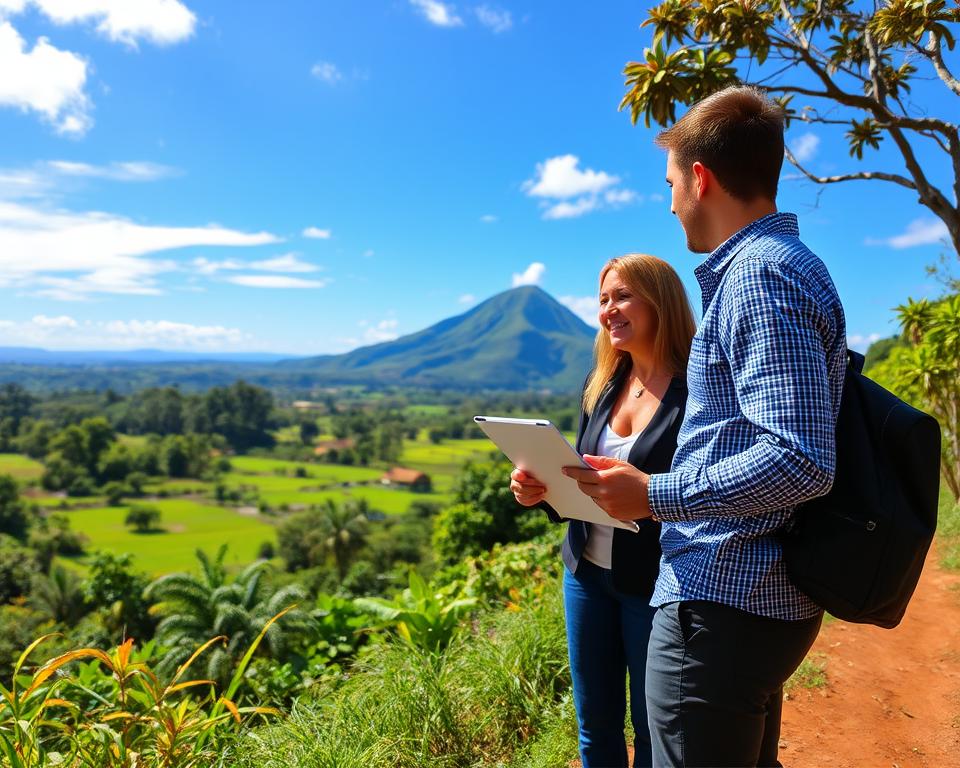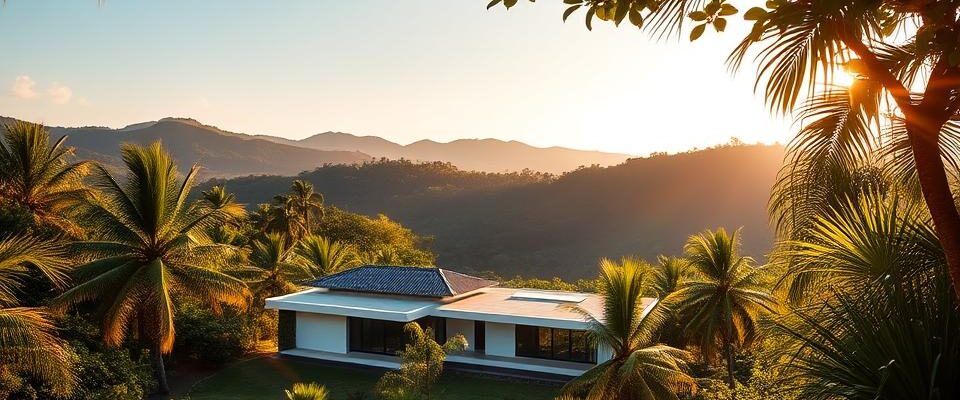Simplify House Hunting in Costa Rica with Gap Real Estate
At Gap Real Estate (Grupo Gap LLC SRL), we simplify buying, selling, or investing in Costa Rica‘s diverse real estate market. With over two decades of coast-to-coast experience, we deliver seamless transactions through expert guidance and clear communication.
Searching for properties in Costa Rica can be a daunting task, especially for foreign buyers. However, with the right real estate team, you can navigate this unique market with confidence. As a foreign buyer, you have the same rights and obligations as local buyers, but understanding the nuances of the Costa Rican property landscape is crucial.
Our team at Gap Real Estate is dedicated to providing you with the guidance needed to navigate the property buying process in Costa Rica. We will walk you through every aspect of the process, from initial market research to closing the deal and beyond.
Understanding the Costa Rican Real Estate Market
Navigating Costa Rica’s property market requires an understanding of its distinct dynamics and regional variations. Costa Rica’s real estate market functions differently than in most other countries, with unique characteristics that affect how the market behaves, the different areas, and the legal side of purchasing property.

Unique Aspects of Costa Rica’s Property Market
Costa Rica’s real estate market is distinct due to several factors. Notably, real estate licensing is not mandatory, which means many individuals present themselves as professional realtors without proper credentials. This lack of regulation affects buyer representation and protection. Additionally, each location in Costa Rica has different market conditions, making it essential for buyers to research before making decisions.
- The absence of mandatory licensing for real estate agents impacts buyer representation.
- Regional market variations significantly affect property values and investment potential.
- Costa Rica’s commitment to environmental preservation creates unique investment opportunities.
Current Market Trends and Opportunities
The current market trends in Costa Rica show increased interest from foreign buyers, particularly from North America and Europe. This trend is affecting property availability and pricing in popular areas. The country’s political stability and growing economy have positioned Costa Rica as a desirable destination for both vacation homes and permanent relocations.
- Increased foreign interest is driving changes in property availability and pricing.
- Emerging areas beyond traditional expatriate communities offer growth potential.
- Costa Rica’s tourism industry directly impacts the real estate market, especially for investment properties.
Legal Considerations for Foreign Buyers
When buying property in Costa Rica, foreign buyers must navigate a unique set of legal considerations. Understanding these legal aspects is crucial for a smooth transaction and to ensure that your property rights are protected. Costa Rica’s legal framework is generally favorable to foreign investors.
Property Ownership Rights for Foreigners
Foreigners have the same property ownership rights as Costa Rican citizens, which is a significant advantage. This equality in property rights makes Costa Rica an attractive destination for foreign investment. Non-residents can own property outright, and there are no restrictions on repatriating capital or profits.

Understanding the National Registry System
Costa Rica’s National Registry system, known as Folio Real, is a centralized computer system that documents all real estate properties. This system ensures that property titles are recorded and verified, providing a secure and transparent property transaction process. The National Registry in San José maintains records of all titled properties, which helps in conducting thorough title searches.
Maritime Zone Restrictions and Zoning Rules
The Maritime Zone Law governs the first 200 meters from the high-tide line on coastal properties, with the first 50 meters being public and the next 150 meters subject to concessions and regulations. Understanding these restrictions is crucial for beachfront property ownership and development. Additionally, environmental zoning regulations, including protected areas and forestry restrictions, may affect property development.
It’s also important to note that title insurance is not currently available in Costa Rica, which limits foreign financing options. However, reputable real estate agencies like Gap Real Estate employ alternative due diligence processes to ensure clean property titles. Buyers should be aware of community-specific regulations in condominiums and gated communities that may impose additional restrictions on property use and development.
Essential Steps for House Hunting in Costa Rica
The process of house hunting in Costa Rica involves more than just finding a property; it’s about discovering a lifestyle that fits your needs and preferences. Costa Rica offers a diverse range of living styles for all ages and expectations, from the vibrant culture of urban areas to the serene tranquility of rural communities.
Researching Different Regions and Communities
To begin your search, it’s essential to research the various regions and communities Costa Rica has to offer. From the Central Valley to coastal areas, each location provides a unique lifestyle. We guide potential buyers through the process of understanding the benefits and characteristics of different areas, helping you make an informed decision.
Setting Your Budget and Financing Options
Setting a realistic budget is crucial when purchasing property in Costa Rica. This involves considering not just the purchase price, but also closing costs, ongoing maintenance, and potential renovation expenses. We explore the financing options available to foreign buyers, including seller financing, international loans, and self-directed retirement account investments, providing practical advice on navigating these alternatives.
Creating Your Property Wishlist
Creating a comprehensive property wishlist is vital to finding the right home. This involves balancing must-have features with nice-to-have amenities, helping you prioritize what’s truly important for your Costa Rican lifestyle. We emphasize considering lifestyle factors beyond the property itself, such as access to healthcare, international schools, shopping, and social communities that align with your needs.
By following these essential steps, you’ll be well on your way to finding your ideal home in Costa Rica. Whether you’re looking for a beachfront property, a mountain retreat, or an urban apartment, understanding the local market, financing options, and your own needs will make the house hunting process more efficient and enjoyable.
Working with Gap Real Estate: Your Trusted Partner
At Gap Real Estate, we pride ourselves on being your trusted partner in navigating Costa Rica’s vibrant real estate market. With over 20 years of experience, we’ve developed a deep understanding of the local market, ensuring that our clients receive the best possible guidance throughout their property journey.
20+ Years of Coast-to-Coast Expertise
Our extensive experience across Costa Rica’s diverse regions translates to unmatched market knowledge, benefiting buyers at every stage of their property search. From the coast to the mountains, we’ve got the local insight to help you find your perfect property.
Comprehensive Services for Buyers and Investors
We offer tailored services for different buyer profiles, whether you’re a retiree seeking your forever home or an investor looking for rental income properties. Our comprehensive approach covers everything from initial property searches to handling complex legal documentation and facilitating smooth closings.
The Gap Real Estate Advantage
By choosing Gap Real Estate, you gain access to our extensive network of trusted professionals, including attorneys, home inspectors, contractors, and property managers. Our commitment to transparency and education ensures that you understand every aspect of your transaction, making your property journey stress-free and successful.
Navigating Property Listings Like a Pro
To find your dream home in Costa Rica, you need to navigate property listings effectively. This involves understanding the terminology used, being aware of the measurement systems, and knowing what to look out for in a listing.
Decoding Costa Rican Property Descriptions
Costa Rican property descriptions can be quite different from what you might be used to in North America or Europe. Terms like “cozy” or “rustic” may have different implications. For instance, a “cozy” house might be impossibly small. It’s essential to look beyond the listing language and understand the local context.
Joining online community pages and blogs can provide valuable insights into local news and views, helping you make a more informed decision.
Understanding Property Measurements and Terminology
In Costa Rica, property is measured in square meters (m2), and “under roof” measurements include terraces, balconies, carports, and garages. This can make the size of the house look much larger on paper than it really is. Paying attention to the square footage of the advertised home is crucial while house hunting.
Red Flags to Watch For in Listings
When evaluating property listings, there are several red flags to watch out for. These include vague legal descriptions, missing documentation, or unrealistic promises about rental income potential. It’s also important to critically evaluate property photos, recognizing when images might be misleading or outdated.
Researching a property’s location effectively using online maps and community resources can help you understand neighborhood characteristics that might not be apparent in listings. Comparing similar properties across different listings and platforms can also help determine fair market value and identify the best opportunities.
For authentic insights into different Costa Rican communities, we recommend checking reliable online resources, community forums, and local blogs.
The Property Viewing Process
To find the perfect property in Costa Rica, understanding the viewing process is key. When searching for a home, it’s essential to be prepared and know what to look for during property tours.
Preparing for Property Tours
Before starting your property search in Costa Rica, preparation is crucial. We recommend creating a checklist that includes documents to bring, questions to ask, and practical considerations like appropriate clothing and transportation arrangements. This preparation will help you make the most of your property viewings.
- Bring the necessary documents and a notebook for notes.
- Prepare a list of questions to ask the agent.
- Consider the transportation and dress code for the viewing.
What to Look for During Viewings
During property tours in Costa Rica, there are several critical elements to evaluate. These include water supply systems, electrical capacity, internet connectivity, and structural features designed for the tropical climate. Assessing a property’s vulnerability to natural events like heavy rainfall, earthquakes, and humidity is also crucial.
Taking Effective Notes and Comparing Properties
Taking detailed notes during property viewings is vital. We suggest using a customizable template to record consistent information across multiple properties. Visiting your top properties at different times of day can also provide valuable insights into factors like natural lighting and neighborhood noise levels.
- Use a template to record information for each property.
- Visit top properties at different times of day.
- Compare properties based on your notes and priority list.
By following these tips and being thorough in your property viewing process, you’ll be better equipped to find your dream home in Costa Rica.
Making an Offer and Closing the Deal
Making an offer on a property in Costa Rica involves more than just agreeing on a price; it requires a comprehensive approach. When buying a property, understanding the local real estate market’s customs and legal requirements is crucial for a successful transaction.
Structuring Your Offer in Costa Rica
In Costa Rica, an offer should be made in an official written format, clearly stating all terms and conditions. This formal approach helps prevent misunderstandings and ensures that both parties are on the same page. Once both parties agree, a real estate broker’s notary will draft a purchase and sale agreement, formalizing the transaction.
The Escrow Process and Deposit Requirements
Upon signing the purchase and sale agreement, it’s customary for the buyer to deposit the agreed-upon amount into an escrow account. Typically, this deposit is around 10% of the purchase price. The escrow process provides a secure way to hold funds until the transaction is complete, protecting both the buyer and the seller.
Closing Costs and Transfer Taxes
Title transfer costs in Costa Rica usually range between 4% and 5% of the total sales price, excluding financial fees. These costs are traditionally shared between the buyer and seller, although they can be negotiated. Understanding these costs upfront helps buyers plan their budget more effectively.
By understanding the process of making an offer, the escrow requirements, and the closing costs, buyers can navigate Costa Rica’s real estate market with confidence. Working with experienced professionals, like those at Gap Real Estate, can further simplify the transaction process.
Property Ownership Structures and Tax Considerations
As a property owner in Costa Rica, you’ll need to navigate various ownership structures and their tax consequences. The decision on how to hold your property can have significant implications for your investment, both in terms of legal protection and tax efficiency.
Individual vs. Corporate Ownership
When it comes to owning property in Costa Rica, investors have the option of holding property individually or through a corporate entity. Individual ownership is straightforward, with the property registered in the owner’s name. However, corporate ownership, through structures like Sociedad Anónima (S.A.) or Sociedad de Responsabilidad Limitada (S.R.L.), offers potential benefits in terms of liability protection and tax planning. For instance, S.R.L. is often preferred for simple asset holding due to its flexibility and fewer formal requirements, while S.A. is more suited for complex businesses.
- Individual ownership provides simplicity and direct control.
- Corporate ownership can offer liability protection and potential tax benefits.
- S.R.L. is commonly used for straightforward property holding.
- S.A. is typically used for more complex business operations.
Annual Property Taxes and Ongoing Costs
Costa Rica imposes an annual real estate property tax of 0.25% on the registered value of the property. Understanding how properties are valued and ensuring compliance with tax obligations is crucial. Additionally, property owners may face other ongoing costs, including municipal taxes and, for higher-value properties, luxury home taxes. For properties held in corporate entities, corporate taxes also apply.
- The annual property tax is 0.25% of the registered property value.
- Municipal taxes and luxury home taxes may also apply.
- Corporate entities are subject to corporate taxes.
By understanding the different ownership structures and their associated costs, investors can make informed decisions about their Costa Rican property investments.
Relocation and Property Management Services

At Gap Real Estate, we understand that moving to Costa Rica involves more than just finding a home; that’s why we offer extensive relocation support to simplify your transition to life in Costa Rica.
End-to-End Relocation Support
Our comprehensive relocation services are designed to help new property owners transition smoothly to life in Costa Rica. From navigating residency processes to setting up utilities and finding local service providers, we handle the complexities so you don’t have to.
We assist with relocation logistics, ensuring that your move is as seamless as possible. Our team is dedicated to making your transition to Costa Rican life enjoyable and stress-free.
Rental and Investment Property Management
Costa Rica’s strong tourism industry and growing digital nomad community make it an attractive location for rental properties. With Gap Real Estate’s property management services, you can expect annual returns of 6-10% or more on your property investment.
Our property management services include marketing rental properties, guest relations, maintenance coordination, and financial reporting. We help you build a reliable team of local service providers to ensure your property remains in excellent condition, whether you’re present or abroad.
Conclusion: Your Dream Home Awaits with Gap Real Estate
Your search for the ideal Costa Rican property ends here with Gap Real Estate, your premier partner in real estate. With over 20 years of coast-to-coast expertise, we simplify the house hunting process, ensuring clarity, confidence, and a stress-free experience for foreign buyers.
We’ve guided you through understanding Costa Rica’s unique real estate market, legal considerations, and essential steps for house hunting. Our comprehensive services extend beyond the property purchase, supporting clients through relocation, property management, and long-term ownership.
By choosing Gap Real Estate, you’re not just buying a home; you’re investing in a lifestyle in Costa Rica with the guidance of experts. To start your journey, schedule a consultation with us today. Visit our website, or contact us via phone, WhatsApp, or email. Let us help you find your dream home in Costa Rica.




